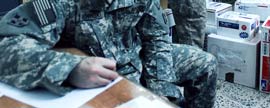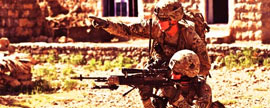The following article is an extract from the book: The Mentor -Everything you need to know about leadership and counseling by CSM retired Mark Gerecht
Some times you can make corrective training more effective by recommending revocation of privileges. The following article provides information of when and how privileges are revoked.
Revocation of Privileges
Commanders have the ability to revoke privileges within their scope of authority. Before initiating or recommending revocation of privileges, Commanders should first establish who has the authority to revoke that particular privilege.
Example
A company Commander may have authority over a Soldier’s pass privileges, but the approval of the garrison Commander may be required to revoke the PX privileges of a spouse.
If there is any confusion concerning who has the proper authority in a given situation, contact your local JAG or IG office for assistance.
When properly utilized in coordination with corrective training, revoking privileges is a useful tool that empowers a leader to correct substandard performance at the appropriate command level without damaging the Soldier’s official record.
Are There Any Rules for Revocation of Privileges?
NCOs do not have the authority to revoke privileges. NCOs typically recommend revocation of privileges and Commanders evaluate the recommendation and implement it if they deem the action appropriate. The privilege being revoked should have some nexus or connection to the offense. Privileges should only be removed for the purpose of correcting a specific substandard behavior. The duration for which a privilege is revoked is directly related to the severity of the offense.
Example
It may be appropriate to revoke a Soldier’s pass privileges for a weekend if they are late to formation. If a Soldier receives a DUI, their on-post driving privileges may be revoked for 6 months to 1 year based on a local policy and procedure. The purpose of such actions would be to correct and educate. The key is to correlate the severity of the offense to the loss of privilege.
Loss of privilege should not be used as punishment. Remember punishment can only be administered under UCMJ proceedings by a Commander.
The Terms ‘Restriction’ and ‘Punishment’
Restriction and punishment are terms utilized during proceedings under UCMJ (courts martial or Article 15). These terms do not apply to corrective training and loss of privileges. This is a fine line you must walk as a leader. Corrective training and loss of privilege are implemented to correct and educate an individual’s substandard performance. This is not punishment. If you are unsure if an action is considered corrective training or punishment, pick up the phone and call your local IG or JAG for clarification.
Examples of Privileges that Can be Revoked
Pass Privileges:
This is the ability for a Soldier to leave a prescribed area, normally a post. The Commander can choose to revoke the pass privileges of a Soldier and only allow that Soldier to go to certain locations such as the chapel, dining facility, and PX. The Commander can also direct that the Soldier be escorted to these facilities. This is not restriction. Restriction is imposed under Article 15 or court proceeding.
Civilian Clothing Privileges:
The Commander may revoke a Soldier’s privilege to wear civilian attire. He may authorize the Soldier to wear the Army physical fitness uniform, AGSU, Army Service Uniform, etc.
Personal Property Privileges:
Several Soldiers have complained to you about a Soldier having a history of playing his stereo very loudly in the billets. You have counseled the Soldier on this issue in the past. You then observe the Soldier continuing this behavior. You can order the Soldier to not use their stereo or limit them from using it during certain hours, say 2100–0800. If the Soldier fails to obey this order then the Commander may impose punishment under UCMJ for failure to obey an NCO or officer. The Commander can also direct the Soldier to remove the stereo from the area permanently. It is important to note that neither you nor the command can legally confiscate a Soldier’s personal item. The authority to confiscate an item is restricted to law enforcement personnel and only during the course of an investigation.
Driving Privileges:
While driving privileges can be revoked by the command, this authority is normally restricted to the Garrison Commander. Each installation, whether in the United States or overseas, have their own policy regarding which command level can revoke driving privileges. This authority only extends to permission to drive any vehicle on post, it does not provide the authority to store or impound a Soldier’s vehicle.
PX or Commissary Privileges:
If a Soldier or their dependents abuses or misuses these facilities, the post Commander or their designee can revoke these privileges. Local unit Commanders do not have the authority to revoke PX or Commissary privileges. The local unit Commander may limit access to the PX or Commissary or require an escort for Soldiers whose pass privileges have been revoked.
MWR Privileges:
The Commander can revoke privileges to the gym, theater, recreation center, auto craft, hobby craft shop, and any other facility that falls under MWR in the case of abuse or misuse. These privileges can also be revoked in conjunction with pass privileges.
Off-Post Living Privileges:
The Commander has the authority, under certain conditions, to revoke the privilege to reside off post. These privileges can also fall under the area of pass privileges.
Alcohol Privileges:
The Commander has the authority to suspend alcohol use under certain conditions. Normally these privileges will not be revoked unless they were in some way responsible for the behavior. Some examples of this might include drunk and disorderly conduct or finding excessive quantities of empty alcohol beverage containers during a room inspection. Revocation of alcohol privileges may also occur when a Soldier is enrolled in the Army Substance Abuse Program (ASAP).
Visitation Privileges:
The Commander can revoke visitation privileges within the unit area.
Termination of Off-Duty Employment or Activity:
The Commander can revoke the privilege to engage in off-duty employment if it interferes or is incompatible with duties, brings discredit upon the Army or creates, or appears to create, a conflict of interest.
Tobacco Products Privileges:
The Commander may restrict when a Soldier uses tobacco products.
Weapon Privileges:
Under certain conditions the Commander may restrict access to service weapons. In extreme cases, the command, in coordination their servicing JAG office, along with military and civilian law enforcement, depending on the location of the Soldier’s residence, may restrict a Soldier’s access to their privately owned weapons.
Examples of When Loss of Privilege May be Applied
A Soldier working nights for a civilian company reports to duty too tired to perform their duties effectively or safely
A Soldier works for a civilian contractor whose business with the government relates to the Soldier’s duties in such a manner that a conflict or perception of a conflict of interest could exist.
A Soldier continually shows up for work late.
A Soldier is having marital problems and cannot currently reside with his/her spouse.
A Soldier is found to have committed an act of DUI or reckless driving.
Soldier continually plays their stereo loud; disturbing others.
Soldier shoplifts from the PX.
Chapter Summary
Corrective training and revocation of privileges are outstanding tools developed to get a Soldier’s attention. If you use these tools correctly you will see a dramatic improvement in the discipline and morale of your Soldiers. Soldiers may not appreciate your actions at the time, but as they mature and grow in the military, they will come to understand that your goal was to improve discipline, maintain the standard, look out for their welfare, and to develop them as a future leader.
I must stress to you that NCOs do not have the authority to revoke privileges. However, they do have the ability to recommend the revocation of privileges to the chain of command. If you document your actions and coordinate with the chain of command they will, almost always, support your decision. Do not use the words “extra duty” or “restriction.” These can only be imposed by a Commander, typically under the Article 15 process.
If you have questions about corrective training and/or revocation of privileges seek guidance from your chain of command, local IG, and/or JAG. Approaching your chain of command to ensure your actions are legal and safe will be appreciated by your chain of command. After all, if you do something that is inappropriate, illegal, unethical, or unsafe while conducting corrective training your chain of command will have to answer as to why they allowed this behavior to occur. When you are proactive in approaching the chain of command, they will typically see you as a leader that is trying to do the right thing and a leader that is willing to solve problems at the lowest level possible.
Do not use corrective training because you saw another leader doing it. Just because they did it does not mean their actions were correct and legal. Furthermore, you can be held accountable for your actions/inactions. You cannot use the excuse you saw another leader do it and therefore thought the corrective training was acceptable. You are duty bound to ensure your corrective training is both legal and safe. A good rule of thumb is to treat your Soldiers the way you want to be treated. If you have doubts about the corrective training and or revocation of privileges then you need to check with your chain of command.
Good Corrective training develops discipline. Bad corrective training instills resentment!
If you have to look for a loophole or find a way to justify your corrective training, it’s not corrective training, it is more than likely punishment or abuse of authority.
Facebook: https://www.facebook.com/MentorMilitary/
Facebook: https://www.facebook.com/Asktop/
Twitter: https://twitter.com/
AskTOP Newsletter: http://eepurl.com/bjcYH
YOUTUBE: Mentor Military https://www.youtube.com/channel/UCj0IXu7SmA2wLoPrNAUfSZA
Websites:
LinkedIn: https://www.linkedin.com/company/mentor-enterprises-inc/














